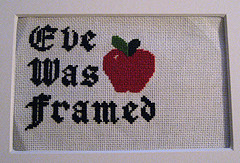Chickens, Cross-Stitch, Burlesque and Women’s Liberation

Don’t look now, but “femivores” are back in the news. Femivores, if you recall, are women who embrace ultra-local food production as feminist statement. Usually this involves some kind of light farming or heavy gardening, possibly some chickens. It’s only a matter of time before the New York Times Magazine does a feature on urban beekeeping as a feminist statement. A couple weeks ago, Peggy Orenstein argued in those pages that keeping your own chickens is the cutting edge of feminism:
“Four women I know—none of whom know one another—are building chicken coops in their backyards. … Apparently it is no longer enough to know the name of the farm your eggs came from; now you need to know the name of the actual bird. All of these gals—these chicks with chicks—are stay-at-home moms, highly educated women who left the work force to care for kith and kin. … Rather than embodying the limits of one movement, femivores expand those of another: feeding their families clean, flavorful food; reducing their carbon footprints; producing sustainably instead of consuming rampantly. […] Conventional feminist wisdom held that two incomes were necessary to provide a family’s basic needs—not to mention to guard against job loss, catastrophic illness, divorce or the death of a spouse. Femivores suggest that knowing how to feed and clothe yourself regardless of circumstance, to turn paucity into plenty, is an equal—possibly greater—safety net.” [NYT]
As I wrote in an earlier post, women are not going to upset the patriarchy by piling on more labor-intensive chores. Instead, women should be fighting for the free time to pursue their own interests, whether it’s gardening or something else.
Today, Echidne of the Snakes addresses another facet of the same trend: “reclaiming” traditional feminine handicrafts, like knitting, as a feminist statement. Echidne wonders why today’s young women are embracing something that earlier generations regarded as drudgery.
It’s a paradox. Here’s my attempt at a resolution. Liberation has two components: objective and subjective. Objective liberation is about concrete gains in the real world like expanding rights, passing laws, raising wages, expanding opportunities, etc. In order to fully enjoy the fruits of objective liberation, however, members of oppressed groups must also subjectively liberate themselves from the self-hatred and reflexive deference has been drilled into them from birth.
Some women find it liberating to openly embrace the feminine and the domestic because it’s a way of defying the old gendered value system that says that anything feminine is automatically inferior. It’s analogous to minority groups reviving their lost languages. Is writing poetry in the heretofore dead language of your ancestors really going to make your group more objectively free? Probably not. On the other hand, there’s a huge psychological boost that comes with reveling in an identity that the dominant group has branded as illegitimate.
I think there’s a similar impulse behind the feminist revival of burlesque. At the end of the day, it’s still mostly women dancing semi-naked for men. The beauty standards are different from those of Madison Avenue, but they’re still pretty conventional. Where’s the liberation in that? For the burlesque enthusiasts I know, the art form seems to be a way of processing society’s mixed messages about the body and sex. We’re told that women’s worth lies in their sexual attractiveness and at the same time that “good girls” aren’t supposed to flaunt their bodies. For some women, sexualized performance feels rebellion against the patriarchy–doing it and getting away with it can be a way of desensitizing themselves to the judgments of others. Objectively speaking, burlesque is not going to challenge the power structure and neither is the opposite tack of eschewing makeup and heels on general principle. But we shouldn’t discount the psychological benefits either strategy may have for women trying to construct their own feminist identities.
Feminists are prone to endless, and fruitless, arguments over whether burlesque or gardening or knitting can ever really be liberating for women, given their historical context. The great thing about a double standard is that you can rebel in either direction! If you like cross-stitch or knitting you choose to interpret these pursuits as a statement about the intrinsic value of discredited “feminine” activities. If you don’t, you can revel in the knowledge that, unlike your great grandmother, you will never have to darn a man’s socks. Or you can rebel by shrugging your shoulders and getting on with the rest of your life. You don’t have to care one way or the other.
The important thing is not to confuse the highly idiosyncratic psychological work of subjective liberation with a political strategy for the objective liberation of all women. Peggy Orenstein is deluded if she thinks there’s any chance that femivorism will be source of economic liberation for women. There is no way the average modern woman will provide even a fraction of her family’s daily calories through home farming. If she were even to try, the task would be as all-consuming for her as it is for beleaguered subsistence farmers all over the world. It’s certainly not economically viable for the average woman to embrace subsistence farming without a subsidy from a wage-earner. So, in the current economic climate, going all-in with the home farm would be a recipe for dependence, not independence.
Embracing the feminine and/or the farm isn’t going to unseat male dominance. We can’t allow the subjective psychological work to distract us from more pressing objective issues like equal pay and reproductive rights. That said, objective and subjective liberation are mutually reinforcing. When you feel good about yourself, you’re more likely to insist that other people treat you with the respect you deserve.
Photo credit: flickr user rauchdickson, distributed under Creative Commons.





